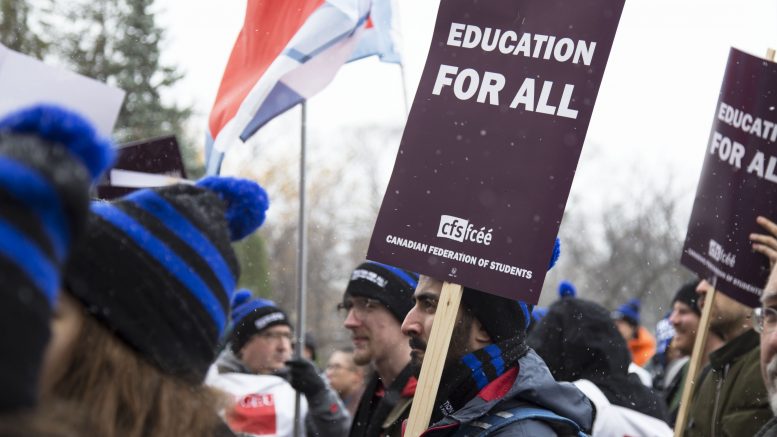Across the country, student debt levels are rising to unprecedented levels. High upfront costs are a barrier students face when making the decision to pursue post-secondary education.
Since taking office in 2016, the Progressive Conservative (PC) government has balanced its budgets on the backs of students and their families.
The list of detrimental changes to post-secondary education is long.
In the fall of 2017, the PC government introduced Bill 31, which allows universities to increase tuition by five per cent plus inflation and deregulates course-related fees.
Despite an overwhelming response from students against the legislation, it was passed.
Following the adoption of this regressive policy, the government released a budget that included decreases in operational funding for post-secondary institutions, leaving them to figure out a way to cover the shortfall.
The 2018 budget also included an overall reduction in scholarships and bursaries funding for students.
To make up for this funding shortfall by the government, universities are maxing out allowable tuition increases for domestic students, reducing staff through attrition or straight cuts and taking advantage of administration’s favourite population to target: international students.
Earlier in the summer, the U of M tabled a budget in which undergraduate international student tuition fees were increased by over $1,000 given a full course load.
This follows the recent elimination of health care for international students at the hands of the Brian Pallister government.
Tuition is one of the biggest barriers for potential students to access higher learning.
According to Statistics Canada, the cost of pursuing a post-secondary education in Canada has increased exponentially over the past few decades. Between 1990-1991 and 2004-2005, for example, average undergraduate tuition fees tripled in Canada with an increase from $1,464 to $4,172.
Raising tuition fees will hinder students from accessing the great power of education, as well as creating a barrier to getting a good job in today’s economy. Furthermore, post-secondary education creates a more informed and dynamic citizenry.
Statistics Canada found the most frequently reported reason why high school students do not pursue post-secondary education is financial constraints. Therefore, increasing the cost of education creates a barrier to economic mobility.
About a generation ago, government funding accounted for over 80 per cent of revenue in university operating budgets.
But over the past two decades, this has changed.
More of the cost has shifted to students and wealthy donors. In Manitoba, the average student needs to work at least twice the number of hours as their 1975 counterpart to pay for the same education.
The Pallister government is failing in its responsibility to make post-secondary education affordable. It is shifting the responsibility of funding post-secondary from the province to vulnerable students and is gradually pricing low- and middle-income families out of post-secondary education.
Lynn Zapshala-Kelln, vice-president administration of the U of M, has attempted to rationalize this trend by suggesting Manitoba’s rising tuition is simply an attempt to raise fees to the levels of other Western provinces.
Rather than engaging in a mad dash to make education unaffordable, how about setting the national standard in providing accessible and affordable education for all?
How about setting the standard in providing public healthcare to international students? And how about building a society where low and middle-class families can achieve more?
Detractors of initiatives like these fail to understand the cost of not implementing these polices. Balancing the budget on the back of vulnerable students comes at a detrimental cost to Manitoba’s future. An educated society results in less dependence on welfare, an economically strong working class, lower crime rates and increases in the economic output.
The PCs presided over $62.8 million in cuts to post-secondary grants, assistance and funding. While justifying these cuts as instrumental to balancing the budget, the same government wrote off $118 million in loans to a multi-million-dollar corporation.
Who exactly are the PCs governing for?
Recognizing the importance of investing in education for the future of Manitoba should be the top priority of any serious and sincere government. Students will access education when it is accessible to them and when their financial situation is not a barrier.
Education is a central societal pillar that has long-term benefits. Keeping this central pillar strong in our province — by investing in affordable and accessible post-secondary education, providing healthcare coverage to international students and ensuring post-secondary education is accessible to all — is not only the best way to keep our universities competitive, but also to bring Manitoba into the future.
Cutting funds for education will not reduce Manitoba’s deficit, but it will reduce access for marginalized and low to middle-income families to post-secondary education.
Dele Ojewole is the Manitoba chairperson for the Canadian Federation of Students.



